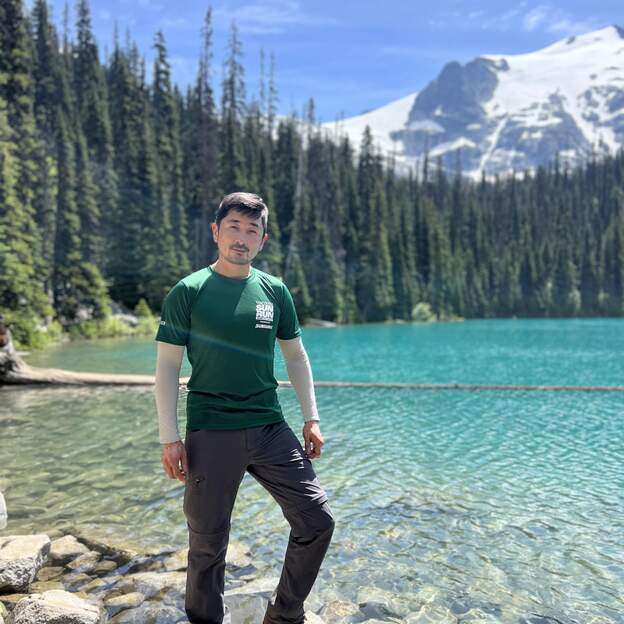President of the BC Mongolian Community Society, Logan, does his best to update people’s knowledge of Mongolia.
When someone once asked if they rode horses to school, Logan laughed. He’s encountered many strange cultural questions in the seven years he’s resided in Canada.
His purpose within the BC Mongolian Community Society is to preserve and promote Mongolian language, culture, and heritage into the mosaic culture of Canada. The group is also focused on keeping Mongolians connected because there’s about 1,000 to 1,500 members in all of BC, smaller than other populations and communities, according to Logan’s estimates.
A parent once asked him if Mongolians make their own bolts of cloth and dye them with plant extracts. “No,” Logan said. “We just buy it from other countries like China or Russia.”
While they preserve and still experience a nomadic life, only a small percentage of the population lives this way. Approximately 30% of Mongolians are classified as nomads, according to Encyclopaedia Britannica.
Logan grew up in northern Mongolia, where it’s a mix of forest and steppes, but mainly forest. His fondest memories about being in nature are the ones he had with his parents: herding horses, and collecting wild blueberries and pine nuts.
But, Mongolia also has “almost every problem that comes from urbanization.”
“We use smartphones, computers, and the internet,” he said. “We have almost everything that exists in Vancouver.”
The possible disconnect between contemporary Mongolia and the ancient times might be due to filmmakers who try to accentuate the nomadic lifestyle to gain and maintain people’s interest.
Logan thinks it would be less engaging if those filmmakers brought up issues of obesity or screen time amongst children.

The forest at home is not like British Columbia’s forest.
“Here, it’s hard to penetrate,” he explained. “It’s very dense, but in Mongolia, it’s not dense.”
While Logan misses his best friend, his parents, and family relatives, he also misses being alone in nature and the nomadic lifestyle. His parents are nomadic and when they’re moving, they’re disconnected and can be alone in nature with each other. If they are near a village, then they can reconnect through Wi-Fi access.
Camping in B.C. is different. “Everywhere, there’s people,” he said. “It’s so hard to find a place to be alone in nature except backcountry camping.”
Moving to Canada was a tough decision for him. When he made the decision to move to Canada, the main reason was to keep his family together. At the time, his wife was accepted into the Master of Applied Science program at University of British Columbia (UBC) and they had a 4-month-old son.
During the first couple of years in Canada, Logan struggled. His idea of this country was informed by western movies where all the people lived in townhouses with expansive yards and everything in life went smoothly.
Reality was harder than his imagination. He said everything is competitive and you need to be hardworking with a lot of patience and effort. He used a lot of physical and mental energy to survive.
Back in Mongolia, Logan was a wildlife researcher and an associate professor teaching zoology and conservation biology in university. He remembers complaining about his desk and asking his dean if they could replace it. A year and a half later, Logan is standing in front of a metal table, holding a knife in a refrigerated room, processing fish.
He learned, if you don’t have Canadian qualifications, then it doesn't matter who you were in your home country. This was one of the reasons why he later applied and joined the Master of Applied Science program at UBC.
The contrast of his past life and his life in Canada challenged Logan’s mental health. He said it triggered him to find himself and learn who he is in this new country.
Currently, Logan is working on his thesis, examining one of Canada’s voluntary environmental approaches in the mining industry in regards to protecting biodiversity.
His wife is an environment consultant at an engineering firm. They had a second child and both kids are currently enrolled in the Canadian school system.
They are figuring out the balance between preserving Mongolian culture and embracing Canadian culture. Logan is currently teaching his kids Mongolian verbally and sending them to their grandparents in Mongolia during the summer. Later, he plans to teach them Mongolian script.

Advice to Newcomers
When asked what advice he’d give to anyone coming to Canada from Mongolia, Logan shared based on his immigration journey.
Be positive and make friends.
Living in a multicultural society, it’s important to make friends with people coming from different countries. Logan once worked at a bakery with a 20-year-old Venezuelan man and they shared their immigration stories. He learned his friend would sleep two hours in the car after the morning shift at the bakery before going to work at a construction site.The main reason was because his friend was sending money back home to feed 18 people. This connection gave Logan some perspective on what he himself was doing in Canada.
Learn English in your home country.
It’s cheaper to learn English in Mongolia than it is to learn it in Canada. Logan said he comes across many people who think they will learn once they arrive, but they are often overwhelmed with figuring out the systems, where to live, where to find jobs, and everything else to focus on learning English.Research opportunities to take for your immigration plan.
Look up what opportunities are available in Canada and how you will get them. At the same time, try to deepen one’s knowledge of Canadian culture and history.Similar to the situation stated above, Logan comes across people who think they will figure it out once they arrive. However, reality has proven that as they try to adapt and learn, these people run out of time and, before they know it, their visas have expired and they don’t have a plan in place.
Be cautious about housing scams.
A lot of scammers pose as housing agents online. They target newcomers, demanding money upfront for deposits to secure housing. People who don’t know this will lose money and have no housing when they arrive.Logan is a member of the Vancouver Local Immigration Partnership Council.

